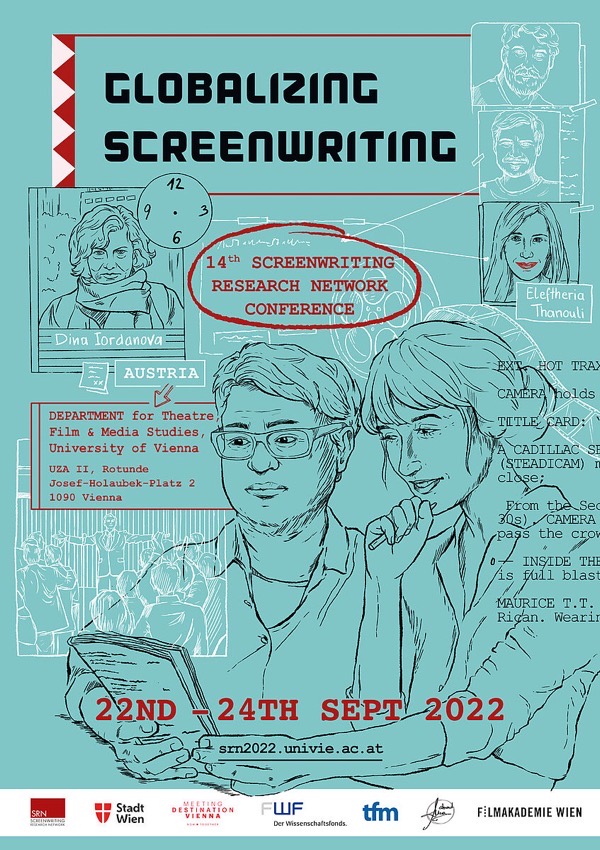Transcript:
…and then “Claudine.” I always have to credit my students. I have a list of films they watch in every of the four semesters we do the history of screenwriting – all chronological from science to modern day – and people come to me and say how come this film wasn’t on the list and sometimes it’s a film I’ve never seen. “Claudine” was a film like that. I’d not seen it. It’s a lovely story about a woman with several children who’s on welfare – so again we’re seeing what happens in the cycles of poverty and when you’re not allowed to get a decent job to move out of that – and she falls in love with James Earl Jones. Early James Earl Jones. So pre-star Wars and he has to decide. He’s a man with a job. Does he want to take on a family and this much obligation and that’s going to get in the way of their love story. So it’s a beautiful love story that has to deal with the issues of poverty but that – just like “Marty” – ugly people can be in love. In this case, people who are so like why can’t you have love if you’re a poor person and how come the issues you face every day are in the way. So this is a beautiful film that I have to credit my students for bringing to you. Written by a male husband and wife team, Tina and Lester Pine but she died young so we don’t see a lot more work from her. Which again is how women fall out of this the history. Many of the women of the early days died in their 40s and the men went on to live to their 80s and did the oral histories and talked about their own world. So the same thing. We lose Tina early on.
Watch this entire presentation
At the recent Screenwriting Research Network conference in Vienna, I gave this talk titled “From Jeanne to Suso to Julie to Spike: How Jeanne Macpherson’s Manual on Screenwriting Influenced Italian Realism which Influenced Black Independent Film in the U.S.”
In the talk, I trace the ways a manual about screenwriting by silent film writer Jeanne Macpherson influenced Suso Cecchi d’Amici who began to utilize Macpherson’s ideas and became the queen of Italian neorealism screenwriting in Europe. Then those Italian neo-realist screenwriters in turn inspired the Los Angeles School of Black Independent Film Makers (the L.A. School). In turn, such as Charles Burnett, Billy Woodberry, Haile Gerima, and Julie Dash and their ideas fueled Spike Lee. Finally, when he became the first Black man to head the jury at the Cannes Film Festival (where Suso had once served) his choice of films influenced yet another generation of screenwriters.
Podcast: Play in new window | Download
Subscribe: RSS
![10 Claudine From Jeanne to Suso to Julie to Spike: How Jeanne Macpherson’s Manual on Screenwriting Influenced Italian Realism which Influenced Black Independent Film in the U.S. [Video]](https://rosannewelch.com/wp-content/uploads/2022/12/rmw-srn-vienna-2022-10.jpg)


![22 Preserving Women's Film History from What Is a Western? Interview Series: When Women Wrote Westerns from the Autry Museum of the American West [Video]](https://rosannewelch.com/wp-content/uploads/2022/12/what-is-a-western-22.jpg)
![09 More On Neo-realism and Black Cinema From Jeanne to Suso to Julie to Spike: How Jeanne Macpherson’s Manual on Screenwriting Influenced Italian Realism which Influenced Black Independent Film in the U.S. [Video]](https://rosannewelch.com/wp-content/uploads/2022/12/rmw-srn-vienna-2022-09.jpg)
![21 Examples of the Heroine's Journey from What Is a Western? Interview Series: When Women Wrote Westerns from the Autry Museum of the American West [Video]](https://rosannewelch.com/wp-content/uploads/2022/12/what-is-a-western-21.jpg)
![08 Neo-realism and Black Cinema From Jeanne to Suso to Julie to Spike: How Jeanne Macpherson’s Manual on Screenwriting Influenced Italian Realism which Influenced Black Independent Film in the U.S. [Video]](https://rosannewelch.com/wp-content/uploads/2022/12/rmw-srn-vienna-2022-08.jpg)
![20 Diversity in the Room from What Is a Western? Interview Series: When Women Wrote Westerns from the Autry Museum of the American West [Video]](https://rosannewelch.com/wp-content/uploads/2022/11/what-is-a-western-20.jpg)
![07 More On Neo-realism in the US From Jeanne to Suso to Julie to Spike: How Jeanne Macpherson’s Manual on Screenwriting Influenced Italian Realism which Influenced Black Independent Film in the U.S. [Video]](https://rosannewelch.com/wp-content/uploads/2022/11/rmw-srn-vienna-2022-07.jpg)
![19 Claim Your Space in the Room from What Is a Western? Interview Series: When Women Wrote Westerns from the Autry Museum of the American West [Video]](https://rosannewelch.com/wp-content/uploads/2022/11/what-is-a-western-19.jpg)
![06 Neo-realism in the US From Jeanne to Suso to Julie to Spike: How Jeanne Macpherson’s Manual on Screenwriting Influenced Italian Realism which Influenced Black Independent Film in the U.S. [Video]](https://rosannewelch.com/wp-content/uploads/2022/11/rmw-srn-vienna-2022-06.jpg)
![18 The Heroine's Journey from What Is a Western? Interview Series: When Women Wrote Westerns from the Autry Museum of the American West [Video]](https://rosannewelch.com/wp-content/uploads/2022/11/what-is-a-western-18.jpg)